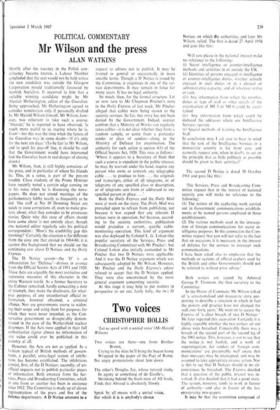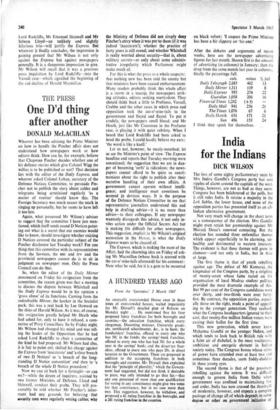Mr Wilson and the press
POLITICAL COMMENTARY ALAN WATKINS
Shortly after the vacancy in the Pollok con- stituency became known, a Labour Member
concluded that the seat would not be held unless the new candidate was outside the Glasgow Corporation mould traditionally favoured by Scottish Socialists. It occurred to him that a suitable winning candidate might be Mr Alastair Hetherington, editor of the Guardian. Being approached, Mr Hetherington agreed to consider nomination only if personally drafted by Mr Harold Wilson himself. Mr Wilson, how- ever, was reluctant to take such a course. `Alastair,' he is reported to have observed, 'is much more useful to us staying where he is. Even'—for this was the time when the future of the Guardian was in some doubt—'if it's only for the next ten days.' (To be fair to Mr Wilson, and to spoil his pay-off line, it should be said that the Government would have intervened had the Guardian been in real danger of closing down.) Mr Wilson, then, is still highly conscious of the press, and in particular of where his friends lie. This, in a sense, is part of the present trouble. Close students of the Prime Minister have recently noted a certain edge coming on to his voice when he is discussing the news- papers. He does not attend meetings of the parliamentary lobby nearly as frequently as he did. The staff at No 10 Downing Street are quick to issue corrections of, even to make pro- tests about, what they consider to be erroneous stories. Quite why this state of affairs should have come about is not entirely clear; though one national editor regularly asks his political correspondent: 'How's the credibility gap this morning?' Certainly the situation is far different from the cosy one that existed in 1964-66; it is against this background that we should see the continuing row about D Notices and the Daily Express.
The D Notice system—the 'D' is an abbreviation for `Defence'—derives in essence from the Official Secrets Acts of 1911 and 1920. These Acts are arguably the most restrictive and repressive measures of this character in the entire Western world. As a former Secretary to the Cabinet remarked, hardly concealing a note of triumph, they make the disclosure, for what- ever purpose, of any unauthorised official in- formation, however obtained, a criminal offence. Nor are governments averse to widen- ing their scope and using them for purposes for which they were never intended, as the Con- servative government so disreputably demon- strated in the case of the Wethersfield nuclear disarmers. If the Acts were applied in their full authoritarian rigour almost no information of any value could ever be published in this country at all.
However, the Acts are not so applied. In a fashion typical of British methods of govern- ment, a parallel, extra-legal system of inhibi- tions has become established. The inhibitions consist, first, of the D Notices; secondly, of un- official requests not to publish particular pieces of information. Both emanate from the Ser- vices, Press and Broadcasting Committee, which in one form or another has been in existence since 1912. The Committee is made up of eleven representatives of the press and five of the defence departments. A D Notice amounts to a
request to editors not to publish. It may be framed in general or occasionally in more specific terms. Though a D Notice is issued by the Committee, it originates in one of the ser- vice departments. It may remain in force for many years. It has no legal authority.
So much, then, for the formal structure. Let us now turn to Mr Chapman Pincher's story in the Daily Express of last week. Mr Pincher alleged that cables were being shown to the security services. So far, this story has not been
denied by the Government. Indeed, sources confirm that a Ministry of Works van regularly takes cables—it is not clear whether they form a random sample, or come from a particular sender or class of senders—along to the Ministry of Defence for examination. The authority for such action is section 4(1) of the Official Secrets Act, 1920. This runs as follows: 'Where it appears to a Secretary of State that such a course is expedient in the public interest, he may, by warrant under his hand, require any person who owns or controls any telegraphic cable . . . to produce to him . . . the originals and transcripts, either of all telegrams, or of telegrams of any specified class or description, or of telegrams sent from or addressed to any specified person or place....'
Both the Daily Express and the Daily Mail were at work on the story. The Daily Mail was prevailed upon to refrain from publishing, not because it was argued that any relevant D notices were in operation, but because, accord- ing to the security authorities, publication would prejudice a current, specific cable- monitoring•operation. This kind of argument was also deployed by Colonel L. G. Lohan (the popular secretary of the Services, Press and Broadcasting Committee) with Mr Pincher : but Colonel Lohan also initially contended to Mr Pincher that two D Notices were applicable. And it was the D Notice argument which was subsequently adopted by Mr Wilson. However, Mr Pincher and the Daily Express's editor refused to accept that the D Notices applied. They were also unconvinced by the more general argument concerning security.
At this stage it may help to put matters in perspective to set out, fairly fully, the two D Notices on which the authorities, and later Mr Wilson, relied. The first is dated 27 April 1956 and goes like this:
Will you please in the national interest make no reference to the following: (i) Secret intelligence or counter-intelligence methods and activities in or outside the UK.
(ii) Identities of persons engaged in intelligence or counter-intelligence duties, whether actively engaged in such duties or in a clerical or administrative capacity, and of sshatcver status or rank.
(iii) Any information from which the number, duties or type of staff or other details of the organisation of MI 5 or MI 6 could be ascer- tained.
(iv) Any information from which could he deduced the addresses where our Intelligence Services operate.
(v) Special methods of training the Intelligence Staff.
In conclusion may I ask you to bear in mind that the task of the Intelligence Services in a democratic country is far from easy and earnestly request you, when in doubt, to act on the principle that as little publicity as possible should be given to their activities?'
The second D Notice is dated 30 October 1961 and goes like this: 'The Services, Press and Broadcasting Com- mittee request that in the interest of national security you will make no reference to the following: (1) The nature of the cyphering work carried out in Government communications establish- ments or by named persons employed in those establishments.
(2) The various methods used in the intercep- tion of foreign communications for secret in- telligence purposes. In this connection the Com- mittee request that you will not refer to the fact that on occasions it is necessary in the interest of defence for the services to intercept such communications.
I have been asked also to emphasise that the methods or systems of official cyphers used by the British and other Governments should not be referred to without prior advice.'
Both notices are signed by Admiral George P. Thomson, the then secretary to the Committee.
In the House of Commons Mr Wilson talked of 'a sensationalised and inaccurate story pur- porting to describe a situation in which in fact the powers and practice have not changed for well over forty years.' He went on to accuse the Express of 'a clear breach of two D Notices ' He later repeated this accusation. Certainly it is highly arguable whether the two notices set out above were breached. Conceivably there was a breach of the second part of the second leg of the 1961 notice. This, however, is not to say that the notice is not foolish, and a work of supererogation; for senders of 'foreign com- munications' are presumably well aware that their messages may be intercepted, and may be assumed to take appropriate evasive action. Nor is this to say that D Notices should in no cir- cumstances be breached. The Express decided that a question of the public interest was in- volved. It also decided that it had a good story. The system, however, tends to work in favour of authority—and also in favour of the less enterprising newspapers.
It may be that the committee composed of Lord Radcliffe, Mr Emanuel Shinwell and Mr Selwyn Lloyd—an unlikely and slightly hilarious trio—will justify the Express. But whatever it finally concludes, the impression is gaining ground that Mr Wilson is not only against the Express but against newspapers generally. It is a dangerous impression to give. Mr Wilson will recall that it was a previous press inquisition by Lord Radcliffe—into the Vassal] case—which signalled the beginning of the sad decline of Harold Macmillan.



































 Previous page
Previous page